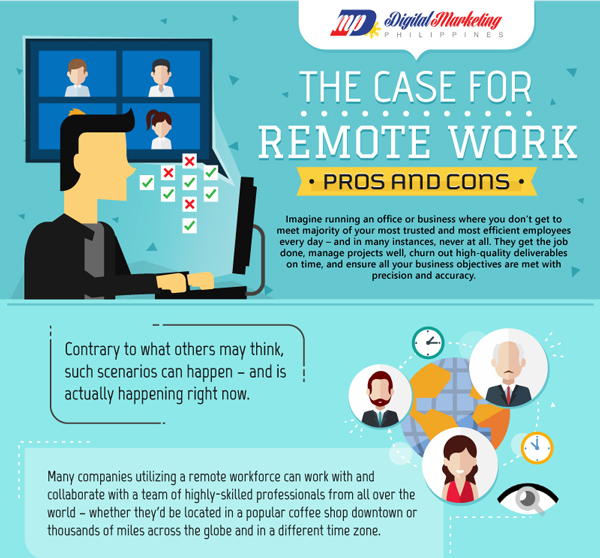Table of Content
One of the joys of being in an office environment is the sense of teamwork you can only enjoy with your colleagues. At home, there’s guaranteed lesser and slower interactions between you and your officemates. And even though you can always hold a meeting online or the phone, you won’t ever be able to pull someone out for a ‘quick’ meeting like you can face-to-face. Being surrounded by like-minded professionals and experts in the field you’re in exposes you to more learning. By working remotely, you shy away from the possibilities of learning from your managers as well as sharing your knowledge with others. Having a work-from-home career can mean different things for different types of people.
Below I will share some things I have discovered since I made the change to being predominantly a person who works from home. One of the biggest challenges you’ll face while working remotely from home is the lack of face-to-face interactions. Most human communications are done just using our body language. Words definitely play a significant role, but expressive body languages are essential too, which is just not possible in this work culture. But if remote work is such a brilliant concept, then why did companies waited for a global pandemic to shift to this? The answer lies in the next sections, where I talk about both sides of the coin, the pros as well as the cons.
Learning Centre
The coronavirus pandemic has provided employees with an option to work from home. It has enabled employers to possess first-hand experience of the benefits and drawbacks of home working. This experience is often very beneficial in the longer-term direction of employees' working practices moving forward. You can save significantly on your overhead costs of running a central office for a large staff in areas such as electricity costs, HVAC costs, building costs, and office supplies costs.

This makes it possible to see things from some interesting angles and think and interpret information more broadly. Working from home will require you to be extremely organized to be successful in your career. Since you will not have an office to go into, you will be responsible for creating your own office at your home. This will require you to keep all your important documents organized and filed properly.
Leadership Difficulties
Transportation is one of the most expensive parts of in-person work — Americans can spend up to $5,000 on transportation each year. Since these jobs are part time and on contractual basis, there is no binding of any sort. So, before deciding to take the leap, you must weigh and consider what’s in store for you. Below, we have highlighted some important points which will help your decision making process easier. When we commute to a place of work, there is movement involved. Many people commute using public transport, which means walking to the bus stop or train station.

You might occasionally finish online courses that combine synchronous and asynchronous learning. My program required a lot of work, but I was committed to it. Even so, I made use of a few of the ancillary advantages of online education. I spent the fall visiting family and old friends in my hometown. In my adult years, I would not have been able to spend as much time with my mother as I did that fall, and it was wonderful. Regardless of your situation, there are plenty of telecommuting pros and cons to consider before making such a big decision.
An introduction to the pros and cons of working from home
Then, there is the movement at lunchtime when we go out to buy our lunch. I have seen a lot of amazing home working spaces with wonderful sets up—better chairs, laptop stands that make working from a laptop much more ergonomic and therefore, better for your neck. When you start the day in a relaxed state, you begin more positively. You find you have more clarity and more focus and you are not wasting energy worrying about whether you will be late. From top to the bottom, from the past till the present and even the future, I’ve discussed everything about this new way of working with you. The intention behind talking about the advantages & disadvantages was to give you a complete knowledge about the reality of work form home.

Remote workplaces make it challenging for your employees to navigate people-related problems as well. In a virtual setting, there is no natural way to have those casual interactions that are surprisingly vital to effective collaboration and teamwork. When employees work exclusively from home, they likely only interact with their coworkers via email, instant messenger, and occasional calls. And they often focus this time on interaction with their own teams and have more limited opportunities to interact with those outside of their team or department. This lack of interaction across different teams and departments can lead to siloed ideas and potential groupthink.
However, as this is a new way of working, it means that employers have to find new ways to structure their business to avoid the dreaded “ghost quitting”. Working from home isn’t a new concept, but we’re still in the infant stage of it being in the mainstream, so it makes sense that we all have a lot to learn. Throughout recent years, “work-life balance” has become a major talking point for companies and workers alike.

But with furniture such as your chair and desk, you have a lot of freedom. An experiment conducted in 2012 found that working from home increased a person’s productivity by 13%, and more recent studies also find significant increases in productivity. One of the biggest difficulties of working in an office is the noise and distractions. If a colleague or boss can see you sat at your desk, you are more approachable. It is easier for them to ask you questions or engage you in meaningless conversations. When we change jobs, we not only change our work environment but we also change the surrounding people.
You may not always have projects, even with multiple clients. Customers and content creation companies can only offer you work when they need something written, so you should always take advantage when there are many projects to choose from. The extra work can make up for the financial woes you may face during those times when fewer work-from-home freelance writing jobs are available.

Humans are adaptable and this adaptability gives us strength. At the start of the year, if you had asked anyone if they could do their work from home, many would have said no. They would have cited the need for team meetings, a place to be able to sit down and get on with their work, the camaraderie of the office, and being able to meet customers and clients face to face. Working from home takes a big toll on your team’s mental health. Some employees even feel overlooked and isolated, and it becomes really hard to build a team spirit when your teams are working from home.
When I had to be at a place of work in the past, I would always set my alarm to give me just enough time to make coffee, take a shower, and change. It’s time to talk about the other side of the work from home story, and we’ll discuss the 3 main challenges it would pose for leaders if fully adopted in the new normal. Coordinating on everyone’s suitable timeline becomes a big problem. Less commute and less office use would lead to less carbon emission.

Some benefits worth considering for your employees include increased flexibility, no commute time, a better work-life balance, and improved mental health. Although the cost of tuition and books for online and in-person courses are frequently comparable, there are some financial factors that may make online learning more affordable. First off, since you can complete coursework online while working at your job, you might not need to quit. (However, be careful not to work so much that you don’t have time for your classes. ) Earning money while in school can greatly ease financial pressure and prevent the accumulation of student loans.
As you do not have to worry about clocking in and out at fixed times, you can arrange your job duties with your other responsibilities easily in a schedule that suits you. Then, you can make any last-minute changes to it if necessary. Remote workers use more digital communication tools, such as chat, email, and video conferencing, than on-site workers, while using less in-person communication. Increasingly, people are decamping from traditional offices and working from home. There are both positives and negatives in pursuing this method of employment. Learning about them can help you decide if you're serious about opting for home-based employment for yourself or your workers.
That means you will be spending the majority of your days and nights during the work week in your home. If your other family members work outside of the house, they may not want to leave the house at night, which could result in you feeling trapped in your own home. One of the major benefits of a home-based job is the proximity to family.

No comments:
Post a Comment